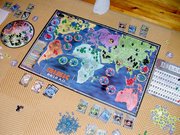Risk 2210
|
|
Risk 2210 is a futuristic Risk variant by Avalon Hill. It shares some of the classic features of the game with some new ones. The designers are Rob Daviau (who also designed Axis and Allies: Pacific, Buffy The Vampire Slayer: The Game and some Star Wars games, including The Queen's Gambit) and Craig Van Ness (who designed Stratego: Legends, Roller Coaster Tycoon, Buffy... and other games).
In 2002, Risk 2210 won the Origins Award for Best Science Fiction or Fantasy Board Game of 2001.
Geographically, the map is nearly identical. It has the same forty-two territories as before, but they have somewhat different names; Greenland, for example, is now the Exiled States of America. Also, a few connections are removed; on the picture you can see that only Egypt has a connection with Middle East.
Significant is the addition of thirteen underwater territories divided into five "colonies" (which work like continents — control the whole colony and you receive a bonus). Moon exploration is also possible. Just build a space station, hire a space commander and go where (almost) no man has gone before. These extra territories also create new avenues of movement and attack between continents.
Each game the map changes. Before any units are placed, four Devastation markers are positioned randomly on the board. Those four territories are nuclear wastelands where no units can go during the game.
One of the biggest changes is the addition of commanders: land, naval, space, nuclear, and diplomat. These fill a number of useful roles. Their most basic function is to act as an improved army unit, as one can roll to roll an eight-sided die rather than the typical six-sider (depending on which commander). Space and naval commanders allow you to move to water or moon territories.Risk_2210_game_board_02.jpg
Energy also has a strategic importance. You use it to buy (and sometimes play) cards, to bring commanders and space stations into play, and to bid for the most advantageous place in the turn order. Each round, players bid energy for the right to choose when they want to take their turns. Looking ahead is crucial — spend too much energy this turn and you'll find yourself playing at a disadvantage next turn.
A last crucial change in RISK 2210 is the turn structure. Each round, players may bet energy to decide on who will play which turn. The highest bidder can choose which turn to take for that round. Second is the five-turn limit. Whoever controls the most territories (and bonuses) at the end of the fifth turn wins. Although there are only five turns, the game may easily last over five hours.
The game also includes the necessary equipment and cards for playing the classic version of Risk on the 2210 board.
Strategy
The strategy for Risk 2210 is much more varied than in traditional Risk. It is quite possible to win on the first round or round and a half if a player strategically outmaneuvers his opponents. By taking the last turn in the first round, and keeping enough energy to buy the first turn in the second round, the player is safe to leave his territories completely unguarded after the first round, earning many reinforcing armies from what would otherwise be reckess conquest.
Some players prefer to fly away to the moon instead of trying to fight on earth, maintaining a small earth presence centered around a space station.
Diplomacy creates intrigue, as players can call cease fire to prevent attack, etc.
Nuclear holocaust has its effects as well, as should be expected.
Otherwise, many strategies are the same as in Classic Risk.
List of most prominent changes to classic version
- There are no missions; the winner is the player with highest score at the end of the last year
- Use of commanders (land, water, space, nuclear, diplomat)
- Command cards that can be bought if one has the corresponding commander in the game
- Armies are acquired through conquest and resource management, not through card trading
- Space stations
- Underwater and moon territories
External links
- Original Risk 2210 page (http://www.wizards.com/default.asp?x=ah/prod/risk2210)
- A Belgian Risk 2210 page (http://www.belgium2210.be)

